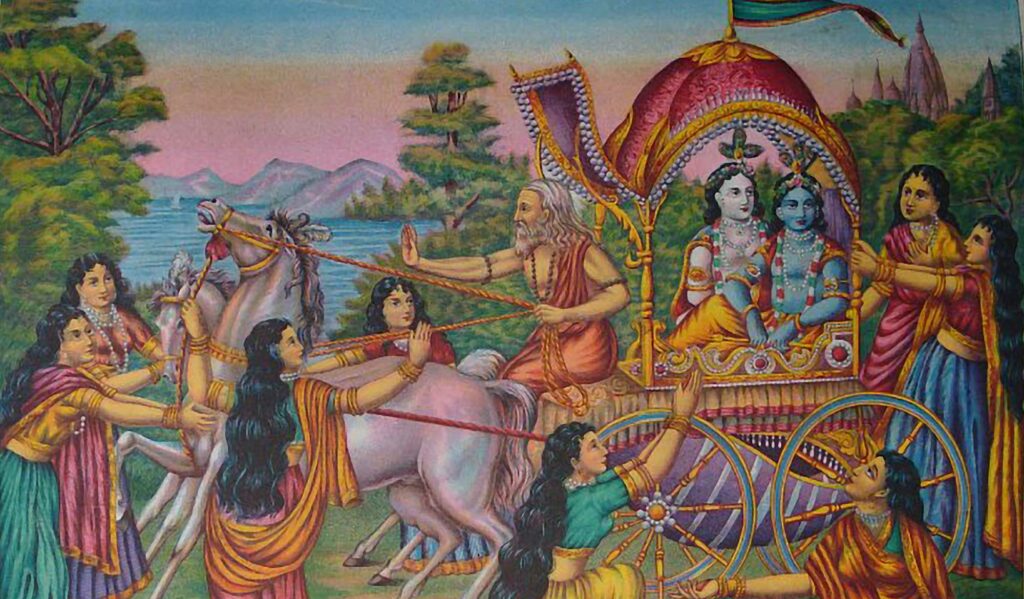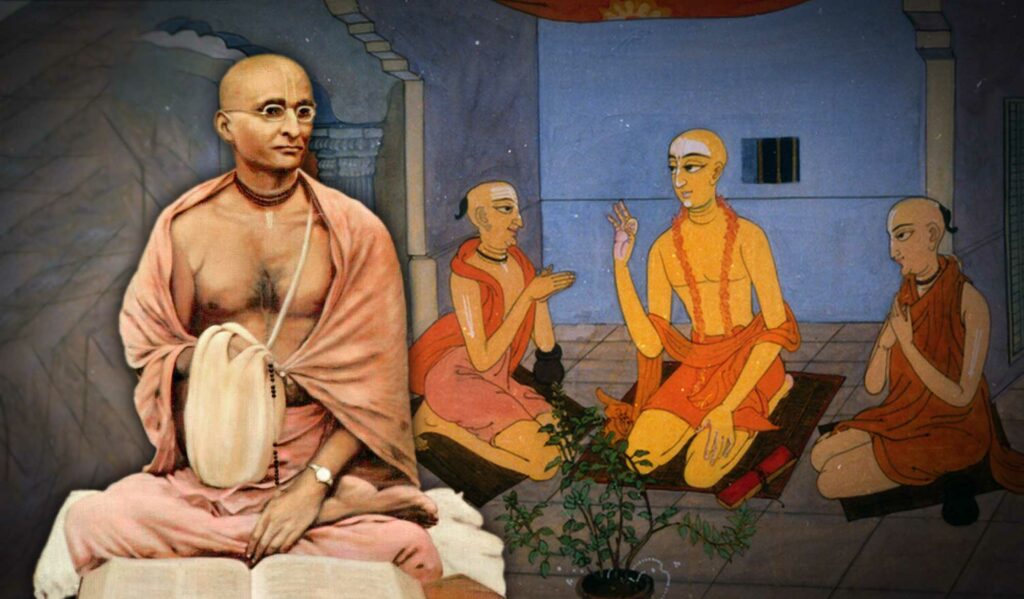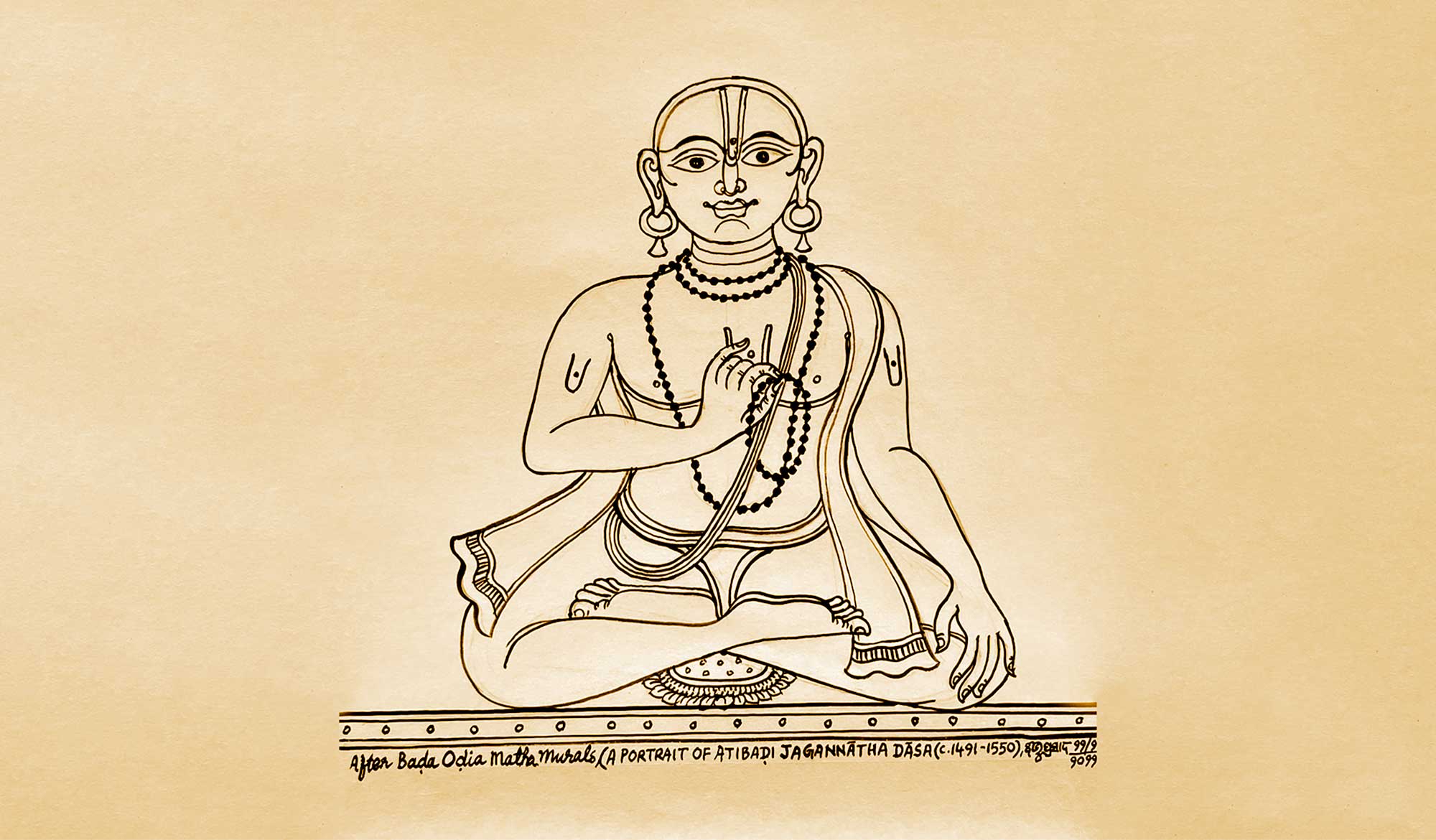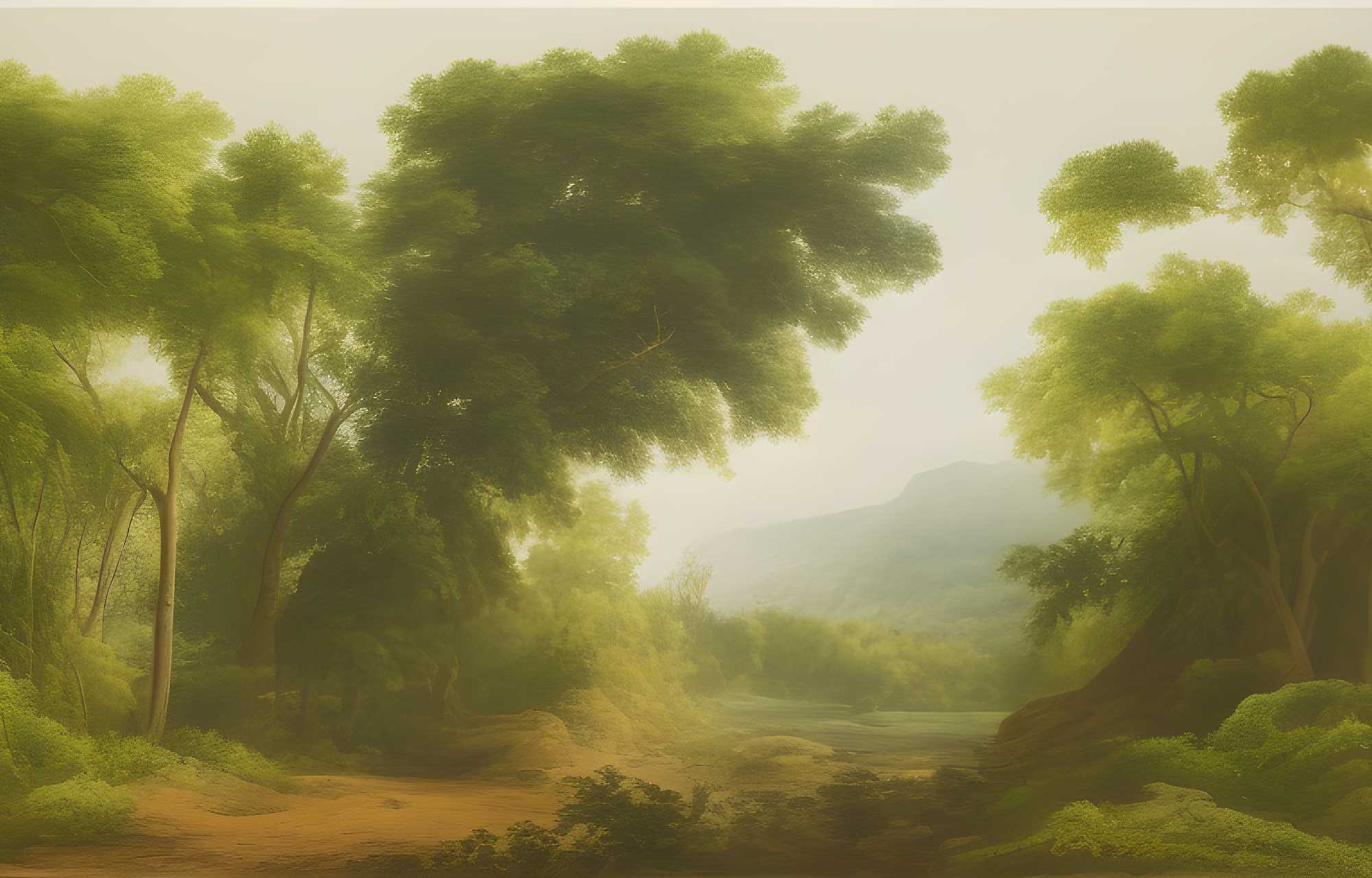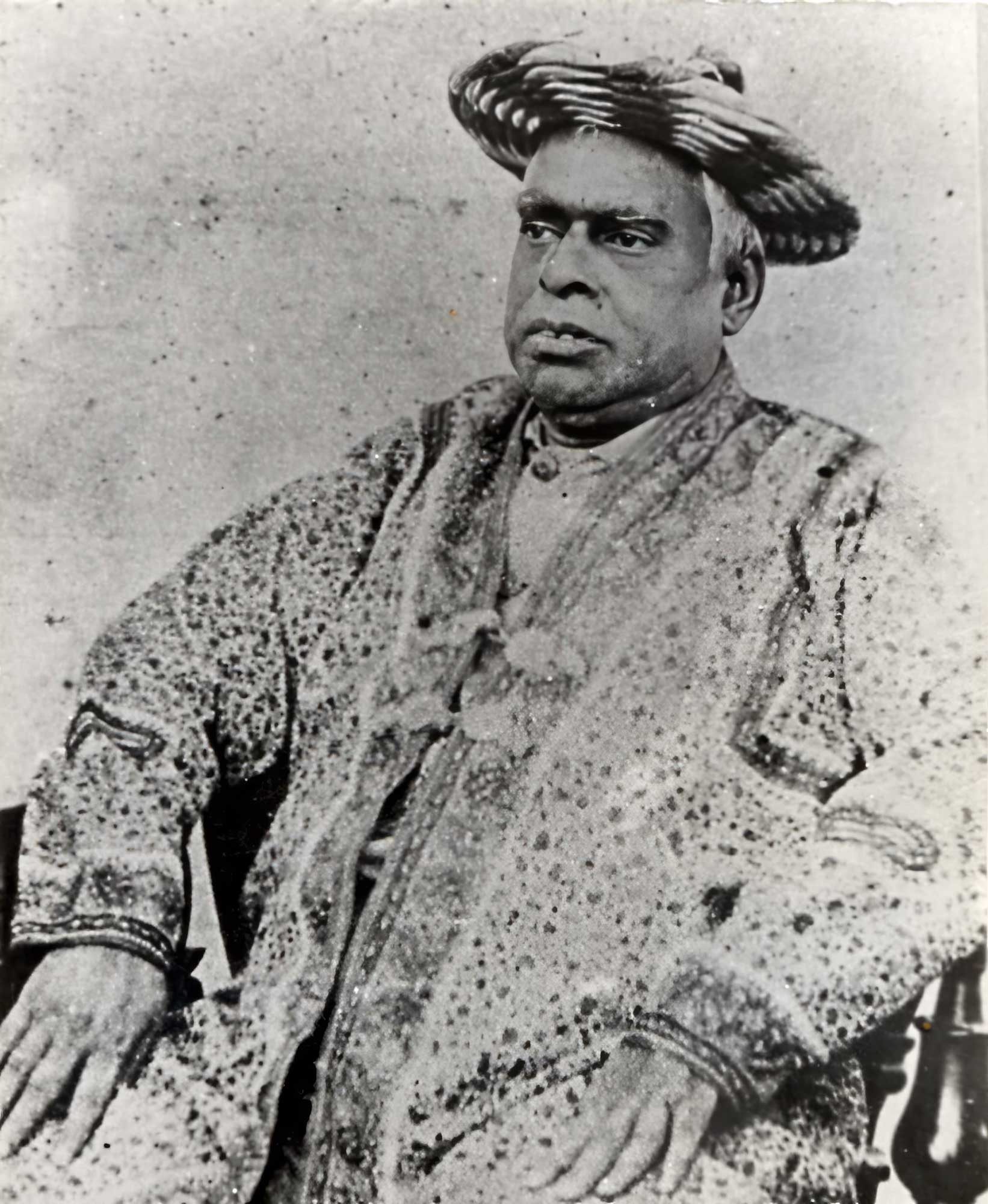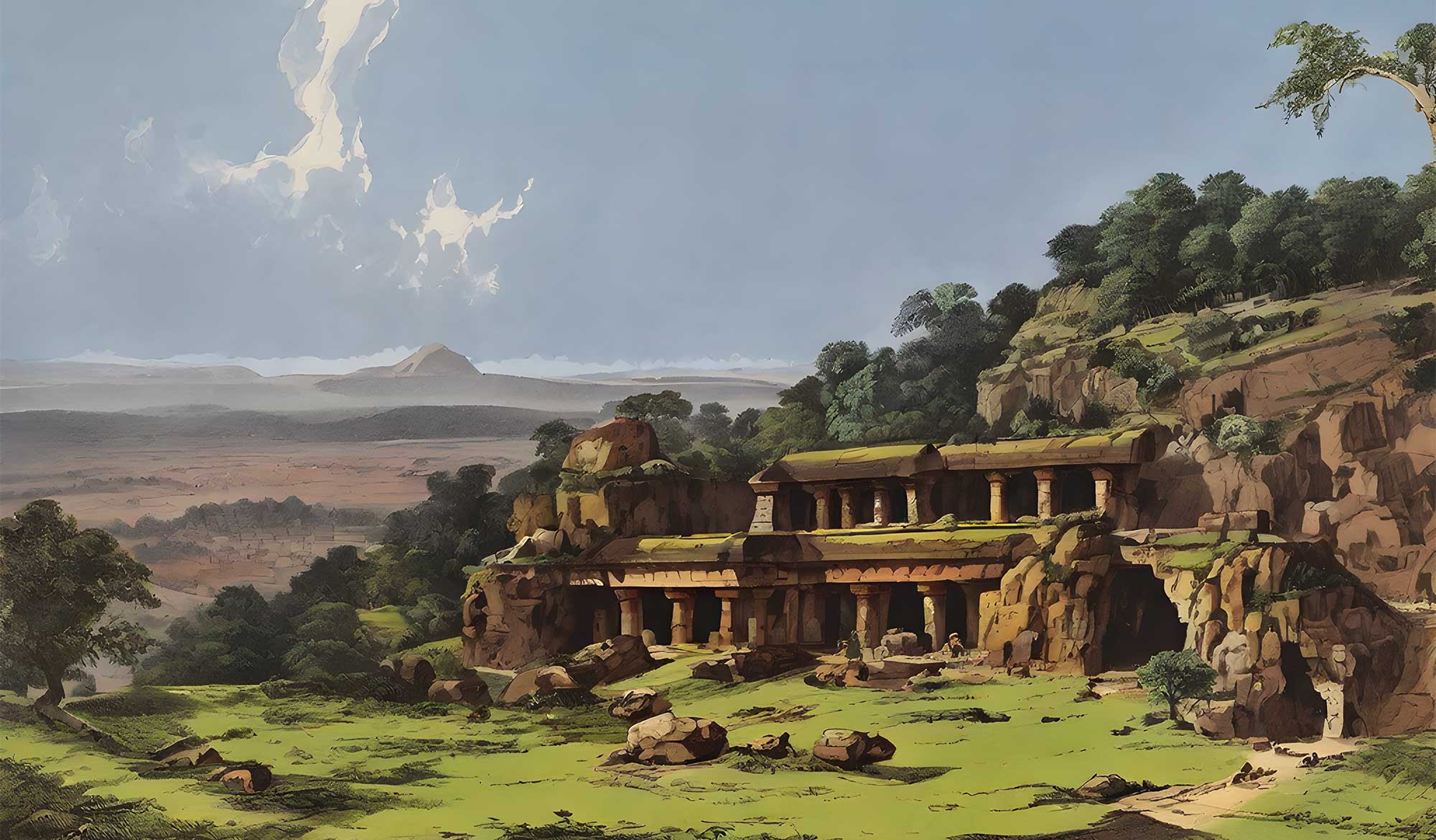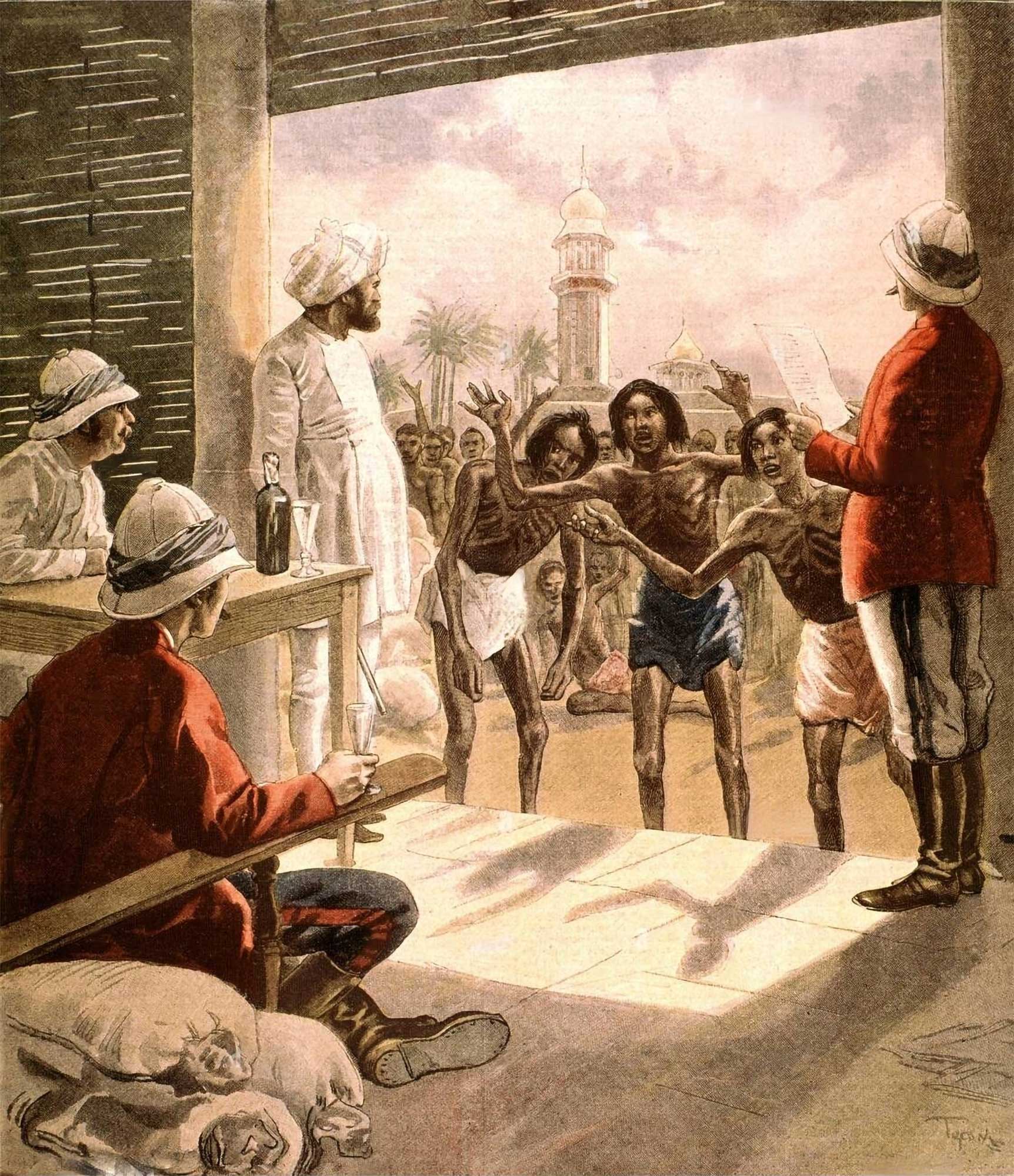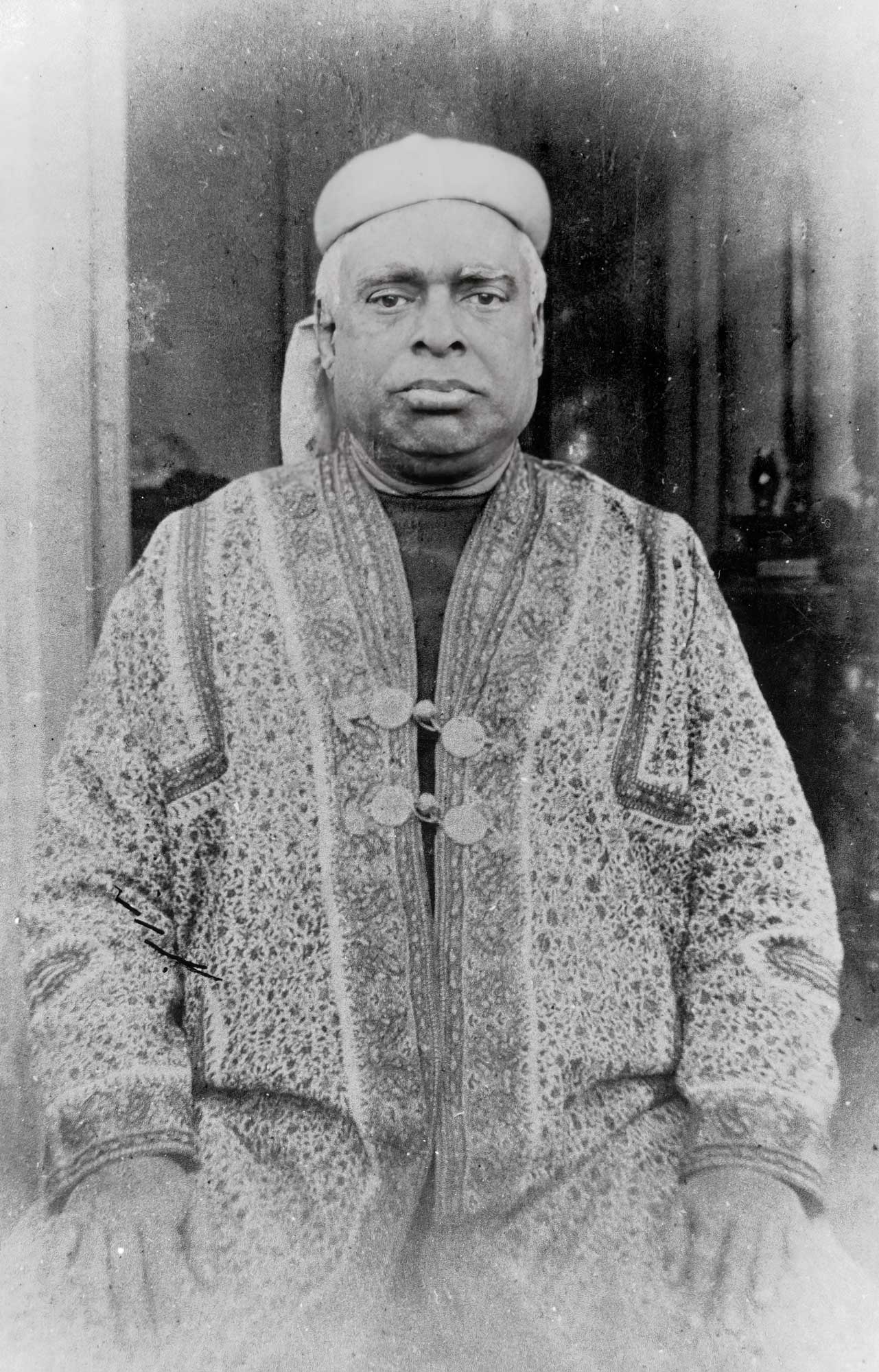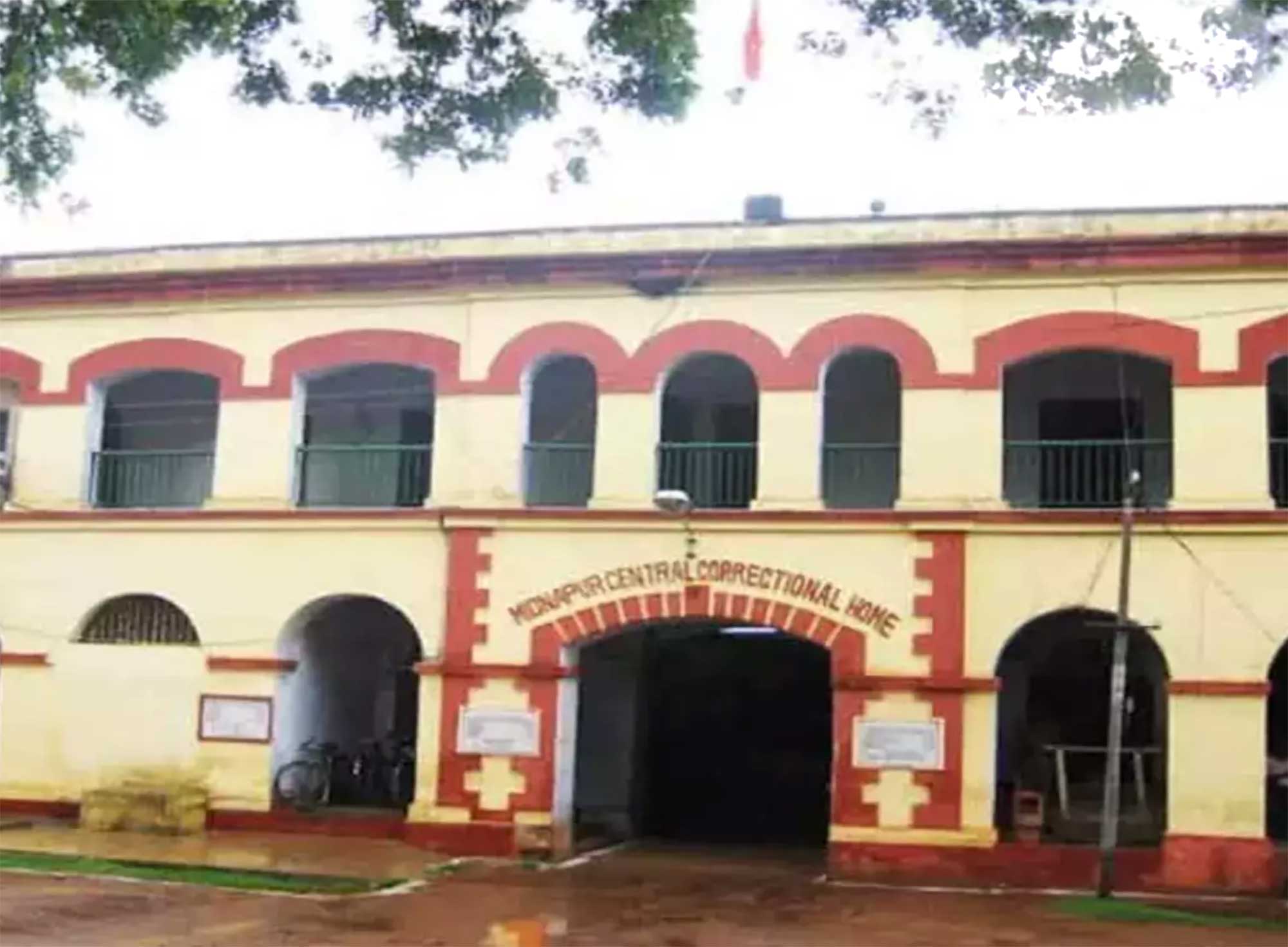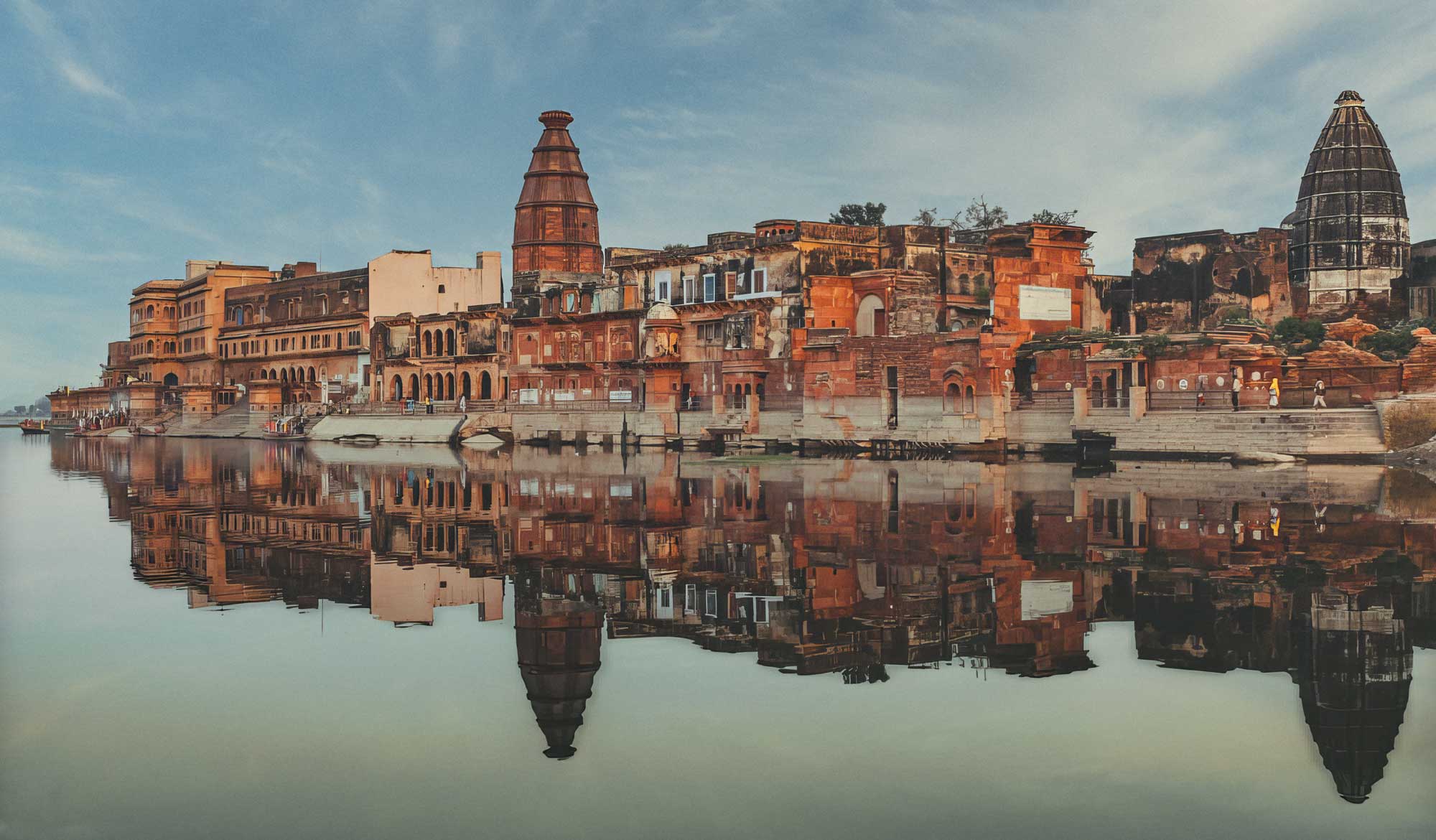Overview
This article was first published in 1897 in Sajjana Toṣaṇī Vol.8, Issues 6, 7, 8 and 11 and was written by Śrī Nitya Sakha Mukhopadhyāya, an associate of Bhaktivinoda Thakura who lived in Balasore, Orissa. In his autobiographical letter, ‘Svalikhita Jīvanī, ’Bhaktivinoda Ṭhākura wrote about this famous event wherein he brought a bogus avatāra to justice in 1871. However this account by Nitya Sakha Mukhopadhyāya is undoubtedly the most detailed version of the incident. It is not known whether the author was personally present or if Bhaktivinoda himself had narrated it to him in detail. Throughout the article, the author refers to Bhaktivinoda as ‘Deputy Babu’ denoting his government position as the Deputy Magistrate of Jagannātha Purī. It is possible that, out of humility, the Ṭhākura had requested the author not to mention his name.
- Part 1 – A Brief History of the Ativaḍīs
- Part 2 – Enter the ‘Avatāra’ Biṣakiṣen
- Part 3 – Biṣakiṣen’s rāsa-līlā!
- Part 4 – Bhaktivinoda meets Biṣakiṣen
- Part 5 – Bhaktivinoda Investigates
- Part 6 – Biṣakiṣen is Arrested
- Part 7 – “The Judgement Should be Placed on You!”
- Part 8 – Bhaktivinoda Visits Biṣakiṣen in Jail.
- Part 9 – The Trial
- Part 10 – The Curse of Biṣakiṣen
- Part 11 – The Verdict
- Part 12 – Epilogue
Part 1 – A Brief History of the Ativaḍīs
In the state of Orissa, there is a religious sect known as the Ativaḍī. The Aula, Bāula, Neḍā, Kartābhajā, Sāiṅ, Darveśa, Sahajiyās etc. are sub-sects that all stemmed from pure Vaiṣṇava dharma and have spread across the land of Bengal. Similarly, the Ativaḍīs also discarded Vaiṣṇava dharma and left the whole of Orissa in ashes. There is no town or village in Orissa where there are no Ativaḍīs!
After accepting sannyāsa, when Śrīman Mahāprabhu visited Jajpur during his travels to Nīlācala, a young brāhmaṇa named Jagannātha Dāsa from that district took shelter at His feet. Mahāprabhu brought Jagannātha with him to Nīlācala. There, Jagannātha recited the bhakti-śāstra to the devotees of Mahāprabhu and received advice on the path of bhakti. After staying at Śrī Kṣetra for a few days, Jagannātha was initiated by Śrīla Hari Dāsa Ṭhākura on the order of Mahāprabhu. After living in Nīlācala for some time, preaching pure bhakti in different parts of Orissa, Jagannātha returned to Jajpur after taking the permission from Mahāprabhu.
Jagannātha soon gathered many disciples after coming to Jajpur, and translated the Śrīmad Bhāgavatam into the Utkal language. As the number of his disciples began to increase, Jagannātha’s heart began to be filled with the desire for fame, and Śrī Mahāprabhu’s philosophy of pure bhakti began to sink into the depths of forgetfulness. Gradually many ambitious desires began to arise in the mind of Jagannātha – he began to feel that he was a special tattva of Śrī Bhagavān! Jagannātha began to insert a philosophy that came from a brain starving for prestige into the translation of the Śrīmad Bhāgavatam. In this way, Jagannātha added five more chapters to his Bhāgavata than the Bhāgavata written by Śrī Kṛṣṇa Dvaipāyana Vyāsa. Far from being full of pure bhakti, that Bhāgavata became filled with the imaginary conclusions of māyāvāda. Jagannātha came to preach Śrīman Mahāprabhu’s doctrine of pure bhakti but created his own great achievements! The glories of his ‘pillar of fame’ are still visible on the horizon of Orissa to this day! The doctrine of pure bhakti secretly fled Orissa in fear.
When his translation of the Bhāgavata was completed, Jagannātha set out for Nīlācala in high spirits with his book. The associates of Mahāprabhu listened to his recitation of his book, and the devotees and Mahāprabhu were surprised! After reading the book, Jagannātha asked, “Lord, what is the book like?” Mahāprabhu said, “Jagannāthā! The Vaiṣṇavas are very lowly, poor and foolish. They do not understand what jñāna-yoga is. I do not have such strength to understand your book! In this book, you have given more wisdom, intelligence and knowledge than Vedavyāsa. You are wiser than all these devotees and Myself – you are even greater than Śrī Dvaipāyana Vyāsa! You cannot maintain any connection with these lowly devotees. They are too fallen, too small, too insignificant, – you are too high – you are ati-baḍī (‘too great’)!”
Jagannātha was not particularly disturbed by these words, as his desire for fame was in full swing at that time. Thus he returned to Jajpur bright-faced. Jagannātha came to Jajpur and began propagating his imaginary religion with full enthusiasm. In this way, Jagannātha’s Ativaḍī philosophy spread throughout Orissa.
Part 2 – Enter the ‘Avatāra’ Biṣakiṣen
In the year 1871 of the English calendar, a preacher of the Ativaḍī doctrine named Biṣakiṣen who was a yogī from Ganjam, established his yogāsana at the edge of the Ekāmra Forest near Bhubaneswar. In various places in Orissa, he began to preach from the Mālikās* in this way – “In this Kali Age I have returned to establish dharma. I, Mahā-Viṣṇu, was peacefully sleeping in the unlimited ocean of milk. Seeing that the people following Hindu dharma were being greatly oppressed by the Mlecchas, Svayambhūva Manu broke my slumber to descend. In a great battle on the 14th of the month of Caitra (April/May), I will slaughter all the Mlecchas and deliver the whole of India!”
*Translator’s Note: The Māllikās were a series of palm-leaf manuscripts written by Jagannātha Dāsa and other members of the Ativaḍī sect which apparently predicted the future.
As this Mālikā of Biṣakiṣen started spreading from village to village, his number of devotees started increasing day by day. Everyone was fascinated by the unusual powers of Biṣakiṣen. Seeing his tall frame, bright eyes, large mass of matted locks, his various āsanas, kriyās and yoga-mudrās, old married women came in droves and took shelter at his feet. “Biṣakiṣen, the great yogī, the great siddha, is the main avatāra of Bhagavān” – this began to be told in every village, in every gṛhastha’s home, on the road, at the ghāṭas, in the marketplace, and in the bazaar. However, all these words were said very quietly and very carefully because there were words against the Raj.
“After a few days, the avatāra will reveal himself, take on his own form and destroy the Mlecchas! Now in the garb of a yogī, Bhagavān in a covered form is purifying the Ekāmra Forest. To those who have not had a child, the great yogī gives them medicine to have children, to others he gives medicine for rheumatism, acid reflux, goitre, or old age. Whatever comes to your mind, he fulfills it. Streams of people from every direction fill the Ekāmra Forest. It is doubtful whether such a large crowd has ever gathered in the world. In the Ekāmra Forest of this great yogī, a yoga-temple will be started through the endeavours of his devotees. On the completion of the temple, the great yogī will establish a mūrti of himself. The Ativaḍī devotees count the days, the villagers await the auspicious hour, the oppressed people and royal officials look forward to when that day will come!”
Part 3 – Biṣakiṣen’s rāsa-līlā!
At this time, one early evening during the full moon, this ‘hidden avatāra’ secretly went to the surrounding villages, and spread the following only to the women, “At midnight tonight, I will perform the rāsa dance. If anyone wants to dance in the rāsa-maṇḍalī, come and join!” The villagers may have understood these words or not, but this type of excitement is exclusive to the lady section in all places. The condition of women before the storm was that as soon as ‘rāsa dance’ came to the ears of the female residents of the city – from that place itself they began to dance! Young women, middle aged women, girls, old women – all got ready to dance with the ‘hidden avatāra.’
In a short time, talk about this rāsa reached the ears of all the guardians of these women. Since nobody had been harmed so far, everything about the ‘hidden avatāra’ had remained secret. He used to come with the aim of nurturing – today, seeing the result of his poisonous fruit in each and every house, bewilderment and agitation arose in them. If the women were restrained, they didn’t know how to stop them. They would not listen to any prohibition. Who has the power to resist such an impulse? Why would one disrupt such an auspicious activity of going to dance in the rāsa-maṇḍala with the ‘hidden avatāra’? In a desperate mood, the women of their families flew towards the Ekāmra Forest like a downwards stream of water, or like moths attracted to a flame. Without seeing any alternative, the men also followed with large sticks in their hands to stop the women. Then all the men came to Ekamara Forest and together, they brought the women back to their homes by scaring them, chastising them, scolding them or beating them one or two times with their sticks. After the līlā of that day, the rāsa–līlā never occurred again. However, nobody dared say anything to the ‘avatāra.’
Then, keeping the women locked in the house, they all consulted one another, “These sort of atrocities cannot continue. It is our duty to remedy it.” After this council, together they applied to the Commissioner of Orissa at Cuttack. The petition was written as follows:
“We, your poor subjects, used to earn a living and resided with our wives and sons, but our community and families cannot live with the troubles caused by Biṣakiṣen, the ‘covered avatāra.’ On that day, he summoned our wives and daughters saying that he would perform the rāsa dance. He is stationed about half a mile south of the Bhubaneswar temple, and has collected about half a million disciples. Soon, after killing the English, he will become king of this state – he is preaching in this way and all the people of Orissa are dancing upon hearing his words. Our prayer is that our nation’s values are preserved if it is so ordered.”
Ravenshaw Saheb was the commissioner of Orissa then. He is the founder of Ravenshaw College. After reading the petition of the villagers, the commissioner was surprised that such an incident was happening so close by. He was even more surprised because he had not yet heard of this. He called his local subordinates one by one and tried to acquire information, but did not get a proper answer from anyone. The British subordinates were not even aware of the details of this matter, and even the Bengali employees could not say anything. By asking one or two locals, he came to know, “It is true there is a yogī named Biṣakiṣen. He has extraordinary powers. It has been heard that if any sick person comes to him, he cures them simply with his auspicious glance. No bad talk has been heard about him.”
Without wasting time, Mr. Walton Sahib, the Magistrate of Puri, conducted a special investigation and ordered the investigator to report the results.
At that time there was a Deputy Magistrate in Śrī Purī-kṣetra who was a pure devotee learned in the bhakti-śāstra and a staunch follower of Śrīman Mahāprabhu. The Magistrate Sahib was aware of his unlimited good qualities and commitment to his duties. Knowing that he was the best investigator in previous matters, the burden of the enquiry fell on him. Irwin Sahib, the Superintendent of Police from Cuttack joined him. Both took twenty to twenty-five members of the police force with them and two police inspectors went out for investigation.
Part 4 – Bhaktivinoda meets Biṣakiṣen
The next day in the early evening, Deputy Babu, Irwin Sahib and the other police officers approached Ekāmra Forest. From there, the yogī’s residence was about two miles away and they set up camp near that place. Later, when the night was getting on, two palanquins were brought. Deputy Babu went in one and Irwin Sahib went in the other, and they set off to visit the great yogī. Two police inspectors and all the other policemen were sent ahead disguised as a small number of pilgrims. When this group of pilgrims arrived at the yogī’s residence, it was eleven o’clock at night. Irwin Sahib’s palanquin was kept at a distance – he did not get down. Deputy Babu also kept his palanquin at a distance and came to see the great yogī on foot. After coming, he greeted him accordingly and sat down on the ground a little distance away. In front of the yogī he saw a smokey sacrificial fire – the pūrṇāhuti (oblation) had been offered and the flames lit up everything around. The yogī was reciting hymns with closed eyes. Some of his devotees were sitting nearby; some were at a distance, talking under the shelter of a tree. Wherever one looked, there were innumerable people of all types. Some were coming, some were looking, some were sitting, some were going. There was no particular colour in the place, but there was an indistinct hue that permeated the entire forest. It was estimated that about one thousand people were in that grove. When Deputy Babu offered his respects, the yogī looked at him from out of the corner of his eye and blessed him. He said, “Babu! You are a Bengali and a distinguished official of the government. What were you thinking to come here at this time of night?”
Babu: “I have come to have darśana of you.”
Yogī: “Why do you desire to see me?”
Babu: “Your name has spread far and wide. The attraction of that name has brought me here.”
Yogī: “Then you are my devotee? Will you say that you have come to get the gift of bhakti to me? Good, good – I am most satisfied with you. Will you listen to some advice?”
Babu: “Please instruct me.”
Yogī: “When you are my devotee and you come from so far to see me, then my intention is to tell you something. You have read Gītā of course. Do you remember my earlier vow?
paritrāṇāya sādhūnāṁ vināśāya ca duṣkṛtām
dharma-saṁsthāpanārthāya saṁbhavāmi yuge yuge
To protect the pious living beings and to put an end to malevolence, I appear in every age to establish dharma. (Bhagavad-gītā 4.8)
So I have come again! I was resting on the milk ocean, and seeing that the Mlecchas were performing great atrocities on the Hindus, Manu woke me from my sleep and I descended. Soon I will kill the Mlecchas. Just see! I have propagated the Mālikā everywhere!”
Saying this, Biṣakiṣen placed a palm-leaf in Deputy Babu’s hand. On it was written:
vanere acchi biṣakiṣen
guptera acchi na jānai āna
tero mīnare ārambhira raṇa
catur-bhuja ho-i nāśiva mleccha-gaṇa
“Biṣakiṣen is in the forest. He is hiding and nobody knows him. His reign will begin on the 13th of the month of Mīna. Manifesting four arms, he will destroy the Mlecchas.”
After reading it, Deputy Babu said, “Excellent! And then what will happen?”
Yogī: “Then I will make India a Hindu nation again. I know that you are a good judge. When there is a Hindu kingdom and you are my devotee, you will make a fine judge. I will give you a prominent position. I hope so. I can give you the responsibility of governing Orissa. In which way are are you ready to rule?”
Deputy Babu thought to himself, “Madness such as this is not evil.” He said, “Who cannot do anything if Śrī Bhagavān causes it to happen. Everything happens according to the desire of the master. If you are he and you think me worthy, then can there be any doubt about that?”
Yogī: “Good, good! I see that you are a good devotee of mine. I will surely make you the king of this country. Even now you remain their servant – I will make sure that you do not have to be their servant any longer. You are my devotee! Of course, you will keep what I have said completely secret for now. Meet me when the war is over.”
Many such things were said – Deputy Babu saw that the ‘hidden avatāra’ had already announced the purpose for which he had come. Now he knew everything about him.
Then the yogī said the following words, “Come here! Why did you come here with a Mlechcha?” Deputy Babu was surprised and thought that maybe the yogī was omniscient or if there were spies. The yogī began to speak about confidential things, all sorts of discussions that had come and gone in the past. A yogī can tell things that another person from a different world does not know. Deputy Babu thought that whatever evil intentions the yogī had, he possessed a strange power. He had such a sharp all-pervading gaze that even the innermost matters of others’ hearts fell before his eyes! No doubt the yogī was a siddha–puruṣa. But he saw that Biṣakiṣen’s fear was growing. He mistook him to be a government employee – for this reason he tried to entice Deputy Babu, a pure devotee, with the temptation of making him king soon. Who can throw dust in the eyes of Bhagavān’s devotee? Just as the yogī read his heart, the devotee was also aware of the heart of the yogī. Then an extremely clever conversation took place for some time.
Deputy Babu asked, “Śrī Jagannāthadeva Himself reigns in Śrī Purī-kṣetra. Why has He left that place and taken refuge in this forest?”
Yogī: “In Purī the people have become mad over some piece of wood! Because they do not know the Supreme, for that reason I have revealed myself in this place!”
As the yogī bragged thus, Deputy Babu got up and spoke.
“Thousands and thousands of devotees have experienced the reality of God through Him. To this day, millions of pilgrims gather to take darśana of Him, and after directly having darśana of Bhagavān, the intrinsic result is an outpouring of bhakti and they become most thankful. Whom Śrīman Mahāprabhu Śrī Caitanyadeva rose to embrace and whom He propagated to the world as Daru-brahma* – you despise that direct form of the Supreme as an insignificant ordinary piece of wood! Like a māyāvādi you are pretending to be the Supreme. However, you speak as though you deny the existence of the Supreme. I cannot understand the inner meaning of your words. Do you know of Mahāprabhu?”
* Translator’s Note: Daru-brahma means ‘The Supreme who has manifest in wood.’
Yogī: “Yes, I know. His home was in Navadvīpa. After becoming a sannyāsī he lived in Purī. He was obsessed with me. He was a devotee of mine, just as you are a devotee of mine.”
Deputy Babu could see that this yogī was extremely unfortunate! Step by step, more serious information was gathered. Indeed, through haṭha-yoga, one gains some external powers. However, the discriminative faculty of intellect is determined by matter, bhagavad-bhakti is simply weak, there is no concept of mādhurya-tattva whatsoever – but the longing to become the Supreme is extremely strong. This is how you bring about your downfall, foolish man!
Deputy Babu explained to Biṣakiṣen how his activities were wrong in all ways. He had no access to the śāstra, no knowledge as to what was dharma and adharma – he didn’t even have any mundane knowledge. Otherwise why did he want to rise up against the British singlehandedly? Hence it is only proper that he be a little cautious. He was a native, a Hindu, and therefore practicing his own dharma, specifically as a sannyāsī – he was blessed with a birth preventing him from such a misdeed full of evil ambitions. Humans deliberately perform their duties hoping for some recognition. However, they are good – they are devoid of the hankering for the prestige of becoming the Supreme. There is no greater offence than propagating that you are God! It is the last limit of hypocrisy – the greatest sign of false ego!
Deputy Babu’s advice did not yield any results. The great yogī’s eyes shone even brighter than before.
With eyes full of rage and with full force he shook head. Slowly, the matted locks on his head began to move intermittently like a nest of snakes. He applied more fuel to the sacrificial fire and said in a hoarse voice, “Your eye of knowledge has not yet opened. Do you still not understand who I am?” Saying this, he let out a terrible scream with an intense and distorted demonic voice. It was as if the heavens had been torn apart! It seemed as though the sound was repelled by the distant mountain range and it began to travel in different directions. The silent world became turbulent with the echo of the echo of the sound! The waters of the lakes, the tree-tops, and the all-tolerant earth also trembled. Immediately the scattered crowd gathered in a circle around the great yogī.
The police officers in the guise of pilgrims started looking at Deputy Babu’s face in fear. Deputy Babu gestured to them and asked them to be assured.
With folded palms, the devotees gathered around on all four sides of the great yogī asked, “What is the Lord’s command?” Biṣakiṣen did not reply to these words. He starred long and intensely at Deputy Babu. Deputy Babu laughed and said, “Whatever, let it be!” A devotee is fearless and steadfast.
Bravely and in a steady voice, Biṣakiṣen said, “Devotees! Go and perform your duties. Babu! You are my devotee – I will not punish you for not having faith in this form of mine. However, this is my command to you – until you specifically recognise me, you should not hinder me from doing anything. You are a Hindu and you follow dharma. Just watch Bhagavān’s activities and do not talk! I have spread my order in the whole of Orissa — there will be no more delay for war. At that time, you will know me.” Just then, a sick person who had drank water which had been contaminated by insects was brought before the great yogī. After many days of illness, the afflicted person had no power to walk.
Some visitors began offering various prayers to the ‘hidden avatāra.’ Relatives of the afflicted man began to express their grief. Showing great agitation, they said that if the disease was not cured, they were ready to lay down their lives at his feet. Biṣakiṣen’s heart melted and he said, “Alright, bring him closer.” They brought the sick man near to him and the great yogī took some ash, placed it on the afflicted area and said, “He will get better.” Deputy Babu was surprised and saw that the patient was in a normal condition. He was unable to understand that he even had a disease. The sick man got up and began walking and in all directions a loud roar of jubilation arose. Deputy Babu thought, “In these matters, Biṣakiṣen has many powers. Having said that however, I cannot allow an unnecessary massacre. All his powers are independent, and ten to twenty thousand farmers fighting with the English is a different thing. There will only be a loss of people and neither side benefits. Thus, deterring him from this sinful ambition is dharma. It is simply the worst type of foolishness for those who have no weapons, no trained soldiers and no knowledge of secret tactics to prepare for war – therefore it is better to avoid it.”
When the cries of elation had stopped, Deputy Babu told Biṣakiṣen, “I see your miraculous powers, needless to say I am surprised. But in the work you are about to undertake, more power is required. Even if you gather a hundred-thousand people of this country, you will not disturb even a hair on the heads of those whom you will fight with. So what is the necessity of killing these jīvas?”
Biṣakiṣen replied harshly, “I expect nothing from the people! Mahā-Viṣṇu is not a beggar for human strength! He himself is powerful enough!”
Deputy Babu laughed and said, “Praṇāmas! But I am leaving now. In the meantime, I will come another day to witness the power of Mahā-Viṣṇu.” Deputy Babu got up and the pilgrims accompanying him also stood up one by one. Biṣakiṣen started reciting hymns with his eyes closed. Deputy Babu did not get into the palanquin and the two palanquins went ahead. After walking a little distance, he called a police inspector over and said, “I will keep ten police guards here secretly until the inspection is over.”
One of the police inspectors whispered, “Sir! We saw his powers. Without any doubts, he is indeed an avatāra…you be careful.”
Deputy Babu laughed and said, “I will take that advice. Lets us go now.” He got into his palanquin and everyone returned to the camp.
Part 5 – Bhaktivinoda Investigates
The eastern horizon was not yet coloured by the morning sun and the stars had just come to rest. The dawn had begun, and the birds, having woken from their sleep, raised their first call. Deputy Babu was waiting to finish his morning ablutions. When the palanquin was ready, he took some plain clothes police officers and went out to investigate.
First he travelled to Khandagiri. There are many different caves on the coast of Khandagiri, and in all those caves reside sannyāsīs, brahmacārīs, yogīs and many sādhakas who are following vratas and have practiced renunciation for a long time. Deputy Babu spoke to everyone and asked about Biṣakiṣen. Who didn’t know the all-pervading name of Biṣakiṣen? They all handed Deputy Babu one copy of the Mālikā a palm-leaf manuscript, sent by Biṣakiṣen. They said, “Biṣakiṣen sent this to request us to join him, but we did not have the time. We told him that there was no possibility of any benefit from us. So has not sent any news since then. What is his position and how he is now, we don’t have the time to get that news either. We desire solitude. Our minds are distracted by noise, so we are sheltering in this cave. We have neither the time nor the inclination to devote our minds to this matter.”
Deputy Babu said, “You have no worries. No one will come to harass you. Praṇāmas – I bid you farewell.”
Deputy Babu returned from Khandagiri and entered the villages. He went to the door of each village, met with the householders and asked about Biṣakiṣen. He understood from the words of the villagers that they were not particularly upset about Biṣakiṣen. Whatever he does, they had no objection but they do not want him living with their wives and daughters. Everyone brought out one palm-leaf manuscript of the Mālikā from their respective homes. A strong belief had developed in their minds that Biṣakiṣen had amazing powers. If he so desires, he can overthrow the British government and become king himself. The villagers were not ready to take his side against the present king. Being poor, they spent all their days gathering food. They had no leisure time to engage in political affairs.
After that village, Deputy Babu entered another village. In that village too, many copies of Biṣakiṣen’s Mālikā were found and the hearts of these villagers came to know about Biṣakiṣen. Deputy Babu wandered around having eaten nothing all day and returned to the camp in the evening. In this manner, he went around for four and five days searching all the neighboring towns, and in all the towns he took possession of the Mālikās of Biṣakiṣen. He searched far into the countryside, and found the Mālika of Biṣakiṣen even in those places. He sent news to all the police stations in the areas of Purī, Cuttack and Jajpur that the villages under the jurisdiction of those police stations had also been sent the Mālikā. The Mālikā of Biṣakiṣen had reached almost every village in Orissa! The investigation continued for almost half the year. During the investigation he understood that Biṣakiṣen was supposed to be the avatāra of Mahā-Viṣṇu and that he had come to deliver the Hindu empire. Almost everyone believed this. However nobody had the courage or the time to join him.
It is true that on a whim, two to four unemployed persons who were inclined to religious practices in the mode of ignorance joined him, and some simple believers who were impressed by his miracles also took refuge in him as an avatāra of Bhagavān. However, the entire population had no sympathy for him. They survive only if they can maintain their bellies and live without worries. They have neither access nor an inclination towards political science. However, is it not strange that illiterate and ignorant people easily became curious to see the strange powers and amazing activities of Biṣakiṣen? His unfathomable power to deliver one from special ailments – such an allurement is no small temptation to man. People are suffering from difficulties, suffering from disease, grief and miseries; if someone finds a person who can remove all diseases, then why not run to him? If it is seen that he actually has that power and all ailments are eradicated at a touch, then the observer is easily stunned, fascinated and humbled. It is true that there were many surrendered people who were impressed by and grateful for this wondrous quality. But having said that, none of them were ready to rise up as a traitor. Biṣakiṣen enthralled everyone by showing miracles and inciting them to rise up against the king, but the innocent citizens of Orissa did not have the courage.
It was needless to delay in gathering more evidence. This one-time investigation revealed enough proof that Biṣakiṣen was blinded by the desire for prestige, and fantasized that he would take over Orissa and sit on the throne of Orissa himself, by displaying some conjurer’s tricks and acquiring followers by pretending to be an avatāra. He was most inventive with this ongoing fantasy. But this fantasy could not become a reality since there was potential for the unnecessary destruction of the population. Therefore it was necessary to relocate Biṣakiṣen and keep him hidden from public view for some days. Otherwise if indulged, there would soon be a possibility of failure.
Part 6 – Biṣakiṣen is Arrested
The next day, Deputy Babu took about a hundred armed police guards, a police superintendent and two police inspectors and set out on a mission. Balianta police station sent a warrant to the effect that, “Three police guards have gone to Cuttack from Purī on revenue duty. They are supposed to return today. They should be detained. They can also come and help if needed.”
When Deputy Babu and his retinue reached Ekāmra Forest it was only dawn. Biṣakiṣen was sitting in front of the sacrificial fire, rocking backwards and forwards reciting hymns with his eyes closed. Previously, about a thousand people had occupied the forest. Now, only a few hundred people sat around Biṣakiṣen. When Deputy Babu and his party arrived, Biṣakiṣen opened his eyes and could not close them – his eyes were fixed on countless men with guns and red uniforms! It was if his eyelids could not close! The devotees who were seated in the crowd moved away in fear, some of them started running towards the village, some of them, to see what was happening, were curious and stood watching like wooden puppets. Within no time the news spread that the government had sent the army to arrest the avatāra, Biṣakiṣen. Those who felt great fear did not leave their house. Those whose curiosity was stronger than their fear, came running in groups to see. Some people were running away, some people were coming to see – this kind of running, hurrying, shouting, pushing and shoving suddenly turned the whole place into a huge fair ground!
Biṣakiṣen could not say anything immediately. Due to what he saw, a rush of excitement ran through his veins, then he became a little calm. Addressing Deputy Babu, he said, “Babu! What is this!”
Babu: “I have come to get you. The government orders you to go to Purī-kṣetra.”
Biṣakiṣen replied angrily, “Who is the government? I don’t accept! No one can afford to relocate me from this place.”
Babu: “If you don’t come easily, we will force you to go.”
“Go on! See what kind of power I possess!” Saying this, Biṣakiṣen began to rapidly shake his head and as his matted locks began crawling like snakes, sparks began to suddenly shoot out of them. His eyes became red and emitted bolts of fire. Everyone was stunned and silent. Who would touch Biṣakiṣen? Who is ready to give up the illusion of life so easily? Everyone stood around for a while. Who knows – perhaps tongues of fire would come and lick their bodies! Everyone was afraid of what calamity may come. The police guard may have been cursing Deputy Babu in their minds – who would know that being summoned would bring such danger?
Deputy Babu said in a serious voice, “Biṣakiṣen! Give up these displays of magic! The British Government has nothing to fear. You must go to Purī. You have conspired against the government and this is known to them. That is why you must be brought under their jurisdiction and you will not be exempted in any way.”
Yogī: “I will not go! If you have the power, then take me!”
Babu: “Alright, so be it!”
Then Deputy Babu ordered four guards, “Quickly bring a bullock-cart from the village.” Immediately, four guards hurried towards the village in search of a cart.
Deputy Babu said, “Look, Biṣakiṣen! The British Government is not so weak as you think it is. You will soon understand what kind of might they have when you are forced to exert all the powers you have accumulated through yoga. If I had understood if you had said you were empowered by Bhagavān, then there would have been a reason to have some hope for you. But you have the opposite idea – you have become Bhagavān. You have stiff competition! Bhagavān is displeased with you for your conduct. Your punishment is inevitable so give up the wickedness! Restrain your passionate nature! You are a sannyāsī who is supposed to be detached from saṁsāra. You accepted sannyāsa in order to renounce the world. Follow that with an attentive mind! Why this vain ambition? Why are you so fond of this insignificant kingdom, wealth, status and fame? Place your consciousness in the true nature of Bhagavān, the source of all happiness and wealth. Please, whatever you have done…the British Government is kind. If you give up your ambition, they will surely forgive you and Bhagavān will be pleased.”
Biṣakiṣen replied angrily, “You still don’t understand! Who am I? When you continue to ignore me again and again, you can have no escape! I still forgive you, but it will be impossible for me to continue to be patient. Will you be desist or not?”
Babu: “If you won’t stop, I won’t stop! Bhagavān sits in judgement to punish you for your wicked ambitions. I am merely an instrument. You have to go to Purī! I cannot hear any more objections from you.”
Yogī: “You do not fear my anger? Once my wrath is kindled, the three worlds will be consumed! It is only because I have mercy on the whole world that I am holding back my rage.”
Deputy Babu laughed and said that he wanted him to go to Purī and he could show his anger all he liked, but for now he had to go to Purī. The vehicle was arriving. “Will you get on it of your own accord, or should I tell the guards to put you in it?” The bullock-cart was brought forward. Biṣakiṣen said, “One day you admitted that you were my devotee. One must keep his devotee’s word! Alright, let us go to Purī.” Biṣakiṣen then climbed the cart. As it moved, armed police surrounded it. The thousands of voices came from the crowd, “Glories to Biṣakiṣen! Glories to Biṣakiṣen, the avatāra of Mahā-Viṣṇu!” The chants in Ekāmra Forest were tumultuous. Thousands of people followed the vehicle accompanied with the sound of wailing. After ordering the Police Inspectors to go along with him, Deputy Babu and Irwin Saheb quickly returned another way. That evening they also set off towards Purī.
Part 7 – “The Judgement Should be Placed on You!”
That day the premises of the Purī Criminal Court was crowded with people. The ‘avatāra’ Biṣakiṣen had been arrested by the British government and brought to Purī. It had already spread all over Orissa that he had been arrested and was awaiting serious punishment, and people rushed to Purī from different directions. Some were curious to know the fate of Biṣakiṣen; some came to protest that Biṣakiṣen should not be punished; some were determined to snatch Biṣakiṣen from the hands of the British! In this way, the entire land from the sea shore to the court premises was filled with innumerable multitudes. Apart from Śrī Jagannātha-deva’s Ratha-Yātrā in Śrī Purī-kṣetra, so many people had never been seen before. The entire area became noisy like a market place with the sound of human voices! The police guards stopped their attempts – but only barely! In their further attempts, the noise doubled and tore through the sky!
After reading the report of the investigation sent by Deputy Babu, the Magistrate Saheb sent it to the Commissioner of Cuttack. The Commissioner Saheb read it and wrote to the magistrate, “Let there be a proper trial of Biṣakiṣen. The innocent will be released and the real culprit will be found guilty and punished. It is necessary to consult with a person who is an experienced religious Hindu to carry out the trial. All the citizens of Orissa seem to be in favour of Biṣakiṣen.”
Magistrate Walton Saheb, who was very intelligent and pious, called upon Deputy Babu and said, “It is necessary that the trial of Biṣakiṣen be performed with special expertise. The entire Hindu population of Orissa are on one side – the government is on the other. Therefore it is necessary to try as far as possible so that the government does not fail in this matter and no seeds of discontent are planted in the hearts of the people. Babu! You are dedicated to your duty. I know that you are well-versed in your scriptures. Thus, it is difficult for this deliberation to be completed by you or even by me. I am a foreigner, and of a different religion. I cannot solve any complicated theory about your religion. It is not possible for me to solve any complicated philosophical points concerning your religion. With special consideration I consider that, as dutiful and just as you are, the weight of this serious judgment should be placed upon you. I believe that without you it would be difficult to execute this judgment delicately and properly. Of course, I will help you as needed.”
Unavoidably, Deputy Babu had to accept the burden of this judicial work.
Part 8 – Bhaktivinoda Visits Biṣakiṣen in Jail.
Biṣakiṣen was under detention in police custody for a week. One day in the afternoon, Deputy Babu came to the jail himself to meet with Biṣakiṣen. He heard that since the day Biṣakiṣen had left Ekāmra Forest, he had not touched even a drop of water. After entering the jail, first he began fasting and was sitting in the same place until now. He had not slept once. He was sitting the same way throughout the day without talking to anyone! Deputy Babu asked him, “Biṣakiṣen, how are you?”
Biṣakiṣen raised his face which was next to his knee once, then hid his face with his knee again. Again Deputy Babu spoke.
“I have heard that you have not eaten anything so far. Will you eat something? I can bring it myself or I can bring it through a good brāhmaṇa. Eat something! How long will you survive like this without eating.”
Then Biṣakiṣen replied, “Until I am no longer in your clutches, it will go on like this!”
Babu: “I can arrange for you to live and eat in a pure manner. Why do you suffer so much?”
Yogī: “You are the cause of my suffering!”
Babu: I am merely executing the order of the Raj. Still now you have time to leave aside your unjust plan/ Your judgement will be done without delay. By pretending to be an avatāra, you are deceiving the world. It is not Bhagavān’s will to kill people unnecessarily. If you realise your insignificant position, you will be delivered from Bhagavān’s wrath. Why did you waste the little energy that you have saved by following such a wicked path? I have told you again and again, go in peace! You are a sannyāsī! Do your duty! Perform sādhana and bhajana! Is treason the duty of a person like you? Still, try to understand your situation! I am deeply saddened by your fate. Seeing your disheartened mood gives me pain within. I am begging you – give up your wicked mentality. Listen to me! live with God alone in your mind, do you need another view, brother? Live exclusively thinking of Bhagavān. Is it necessary to think of anything else, brother?”
Biṣakiṣen said angrily, “Do what you can! Mahā-Viṣṇu is not under your jurisdiction! I am not saying anything now….let us see how far you can go. But you have no escape. You have neglected Mahā-Viṣṇu’s power. Once again, you have become a slave to punishing and endangering Mahā-Viṣṇu’s avatāra. Your punishment is essential! Even if Viṣṇu comes to your side, you will not escape. You are still a śaraṇāgata (surrendered devotee), but there is no more protection!”
Deputy Babu said with a smile, “If your sickness does not go away, what else can I say? Then I should understand that Bhagavān does not forgive you anymore. Well, I am saying goodbye for today – praṇāma.”
Part 9 – The Trial
The day of the case had arrived. It was almost past two o’clock and the ‘avatāra’ Biṣakiṣen, surrounded by armed guards, emerged from the jail and entered the courthouse. Biṣakiṣen was brought before the judge. Many noble subjects of Orissa had gathered together and appointed prominent advocates to support Biṣakiṣen. Advocates on behalf of the government also sat in their seats. The courthouse had become a forest of people. All the way from the seashore there was a stream of people flowing and only the loud voices of people could be heard!
There was no assertion or counter assertion that day. Only one or two witnesses were taken into custody. The counsel for the Government raised questions and laid down the law. The time passed as arrangements were made and the court was adjourned for that day. The case was set for one day a week later. Deputy Babu came down from the judge’s bench. As the guards were attempting to take Biṣakiṣen back to jail, he pointed at Deputy Babu and said, “Babu! Have you not yet become despondent? Everything will be ruined for you! Go home and see that you are doomed! Do not provoke my wrath any further.”
Deputy Babu did not reply and left in a serious mood. Biṣakiṣen was returned to jail again.
Deputy Babu went home and saw that one of his daughters was in terrible pain. She was unable to get up and often lost consciousness – sometimes giving inexplicable screams due to some physical pain, and sometimes losing consciousness due to unbearable agony! Crying arose throughout the house. Seeing her, the family members cried more and more in bewilderment. For a moment, Deputy Babu was distracted. He became calm again and thought, “Is this the curse of Biṣakiṣen? If this is his work, so be it! I cannot be distracted from the right path, nor can I be derelict in my duty. Whatever is Śrī Bhagavān’s desire, so be it! If the mind remains fixed on His holy lotus feet, it is auspicious – I do not know anything else to be auspicious or inauspicious. Biṣakiṣen is an ordinary jīva – what is his power? Only Bhagavān’s desire will be accomplished. I will do my work, and He will do His!”
Deputy Babu sent people to call a doctor and reassured everyone in the house. The doctor came, treatment was given, and the young girl recovered after four or five days.
Part 10 – The Curse of Biṣakiṣen
Once again, the day of the trail arrived. Witnesses were accepted. The arguments of the lawyers on both sides turned into arguments. The witnesses were cross-examined. The trial did not end that day either. It was adjourned again for the next day. At the time when the court was adjourned, Biṣakiṣen pointed at Deputy Babu and said in a loud voice, “Do you understand what happened in your house? Are you still not conscious? Again and again I forgave you, but you did not learn! Tell me, what should I do? If you pass your final judgment tomorrow, it will be your last day! I will take all your strength tomorrow! By supporting the Mlecchas, you have neglected the avatāra! Tomorrow there will be an atonement for all your sins! Tomorrow I will see how you sit in court and give orders!”
Biṣakiṣen was returned to jail again and Deputy Babu also returned home. At the time that the court was adjourned, he suddenly felt a sharp pain on the right side of his chest. Gradually as the night passed, the pain began to increase. The pain became excruciating. He understood that this was also Biṣakiṣen’s plan. He was not perturbed by this at all. A devotee is fearless and steadfast. When he has taken shelter of the truth, he is not concerned with any evil occurrence in this world. He cannot refer to a deceiver as an avatāra of Śrī Bhagavān. Even if he has to die, that is auspicious. Who can refer to Śrī Gaurasundara, the life-force of the universe, as simply an ordinary devotee? Not only that, but will a devotee defile his own tongue by claiming that Bhagavān Goloka-vihārī, the Lord of the fourteen worlds, is his devotee? Whatever powers he may have, he is a serious offender!
People went to call a doctor who came and gave some medicine, and a pain-balm for massage. Hot water compresses were given to his chest and face throughout the night. Even though the pain decreased, he would have to suffer for two to four more days – but the verdict was supposed to be given in the next day! If he was absent due to illness, Biṣakiṣen would have the chance to spread his power. Those ideas would be firmly established in all the people and Biṣakiṣen would be given more of an opportunity to achieve his ambitions. Many heard that Biṣakiṣen had punished Deputy Babu. All these thoughts made him change his mind.
The night passed in this way. When the morning came, Deputy Babu felt some relief, but there was a throbbing which caused great pain in his chest! Was he to go to the courthouse or not? Again warm water compresses were given on his chest and he was massaged with the balm. Around ten o’clock he felt a little relief. Without moving his hands and feet too much, he could sit still in the palanquin – this was enough. Wearing his court clothes and a flannel tied around his neck, his palanquin arrived at the courthouse and he entered. The report had been prepared the night before and, after checking it carefully, he signed his name and gave it to the chief clerk to read. Everyone amongst the veritable forest of people assembled was excited – “What was happening? What was happening?”
Biṣakiṣen pointed at Deputy Babu and said, “Do you understand what is happening to your body?”
At that moment, his chest felt as if it were cracking. Deputy Babu did not reply.
Part 11 – The Verdict
The verdict of the trial was that Biṣakiṣen was found guilty. The fact that he was inciting subjects to commit treason and attempting to take the throne of Orissa himself all came to light in the cross-examination of the witnesses. Many witnesses tried to conceal this, but it was revealed. What was reported from the investigation, was corroborated by the testimonies of the witnesses. The advocates of Biṣakiṣen tried to prove that he was innocent, but it was all in vain.
The verdict was over. Deputy Babu told Biṣakiṣen, “You were inciting the people to rise up against the royal power of Her Majesty the Queen. You are sentenced to eighteen months imprisonment with hard labour under the Penal Code.” The large crowd screamed like a turbulent ocean and the heavens were split with the sounds of “Injustice! Injustice!”
Deputy Babu went home after the court recess, and surprisingly there is no more pain in the body! He could walk home.
Reader! Do you recognise this legendary Deputy Babu?
Biṣakiṣen was brought out of the courthouse in handcuffs. He was without any vitality, and was devoid of any final words. He was to wear prison clothes and his mustache, beard and hair were to be shaved off. None of the natives had the courage to touch his matted locks. All of them said that whoever touched them would be burnt immediately! Seeing that the natives were retreating in fear, the Doctor Saheb of Purī came forward. In the middle of the courthouse yard in the presence of thousands of Biṣakiṣen’s devotees, Doctor Saheb seated Biṣakiṣen down and cut his hair with a pair of scissors, then the natives came and shaved off the rest of his hair. Everyone stood around and watched, as motionless as painted figures. Then and there, Biṣakiṣen was given prison clothes and surrounded by guards, like a caged lion, Biṣakiṣen was transferred to prison.
Part 12 – Epilogue
When an insignificant human being of limited strength ascends to the highest peak of desiring fame, then his sense of duty is completely destroyed, his false ego is nourished and that replaces his humanity. The advice of a friend, the advice of a counselor, seems to be inconsequential – you are supposed to have incomparable power, you are the possessor of all potencies, the embodiment of justice! This was the status of Biṣakiṣen. He wanted to sit on the throne of Bhagavāṇ, having gained only a small fraction of perfection performing some Haṭha Yoga. Alas! This is Māyā’s inconceivable influence!
Even if liberation, yogic perfection, and unlimited opulence are encountered, the devotees of Bhagavān throw them far away with great contempt. This great yogī did not hesitate to identify himself as God after achieving only a fraction of that siddhi! What a difference there is between the devotee and the yogī.
This contagious disease has spread everywhere today! There is no shortage of this in Bengal. Some are trying to become an avatāra of Brahmā, some an avatāra of Viṣṇu, and some even an avatāra of Śrī Gaurāṅga. Nowadays, if you can use a little trickery, you can become an avatāra! As many people that you can throw dust in their eyes, one is a great avatāra! I have heard that, just like Biṣakiṣen, one great avatāra of Gaurāṅga is secretly roaming around us! One day he will surprise us by revealing himself. Some people have already discovered him. The avatāra faints, his teeth chatter, the hairs on his body stand on end – as many sattvika-bhāvas there are, they will all be displayed by him! All glories, all glories to him!
Perhaps if this great avatāra of Gaurāṅga sees or hears about the conclusion concerning Biṣakiṣen, the ‘avatāra’ of Mahā-Viṣṇu, as we have reported, then he will die. That will be auspicious – otherwise who knows what his fate will be?
This article was translated from the original Bengali into English by Swami B.V. Giri.
Related Articles
- A Rūpānuga’s Constant Meditation Concerning Śrī Ratha Yātrā by Śrīla B.R. Śrīdhara Mahārāja
- Śrī Nimbāditya and Nimbārka Are Not the Same Person by Śrīla Bhakti Prajñāna Keśava Mahārāja
- Ratha Yātrā in Navadvīpa by Śrīla Bhakti Gaurava Narasiṅgha Mahārāja
- A Brief Response to Ratha Yatra in Navadvīpa by Śrīla Bhakti Gaurava Narasiṅgha Mahārāja
- Bhaktivedānta by Śrīla Bhakti Gaurava Narasiṅgha Mahārāja
- Śrīdhara Deva Gosvāmī by Śrīla Bhakti Gaurava Narasiṅgha Mahārāja
- Ativāḍī Apa-Sampradāya by Śrīla Bhakti Gaurava Narasiṅgha Mahārāja
- Hita Harivaṁśa and the Rādhā-Vallabha Sect by Swami B.V. Giri
- The Temple of Understanding by Śrīla Bhakti Gaurava Narasiṅgha Mahārāja
- Māyāpura and the Adbhūta Mandira by Śrīla Bhakti Gaurava Narasiṅgha Mahārāja
- The Adbhūta Mandira and Bhaktivinoda’s Vision by Śrīla Bhakti Gaurava Narasiṅgha Mahārāja
- Nimbārka and Keśava Kāśmīrī by Śrīla Bhakti Gaurava Narasiṅgha Mahārāja
- The Mystery of the History of the Līlā of Dāmodara by Śrīla Bhakti Gaurava Narasiṅgha Mahārāja
- Prabodhānanda and Prakāśānanda by Swami B.V. Giri
Further Reading
- A Discussion in Relation to the Dates of the Six Gosvāmīs by Śrīla Bhaktivinoda Ṭhākura
- Śrī Śrī Rūpa Gosvāmī Prabhu by Śrīla Bhaktivinoda Ṭhākura
- Śrī Śrī Sanātana Gosvāmī Prabhu by Śrīla Bhaktivinoda Ṭhākura
- Śrī Śrī Gopāla Bhaṭṭa Gosvāmī Prabhu by Śrīla Bhaktivinoda Ṭhākura
- Śrī Śrī Jīva Gosvāmī Prabhu by Śrīla Bhaktivinoda Ṭhākura
- Śrī Śrīnivāsa Ācārya Prabhu by Śrīla Bhaktivinoda Ṭhākura
- Śrī Śrī Kṛṣṇa Dāsa Kavirāja Gosvāmī Prabhu by Śrīla Bhaktivinoda Ṭhākura
- Śrī Śrī Prabhu Rāmacandra Gosvāmī by Śrīla Bhaktivinoda Ṭhākura
- Kavi Rāma Prasāda (The Poet Rāma Prasāda) by Śrīla Bhaktivinoda Ṭhākura
- Śrī Śrī Abhirāma Gosvāmī by Śrīla Bhaktivinoda Ṭhākura
- Śrī Parameśvarī Dāsa by Śrīla Bhaktivinoda Ṭhākura
- Śrī Jāhnavā Devī by Śrīla Bhaktivinoda Ṭhākura
- Salve for the Eyes of the Blind by Śrīla Bhaktivinoda Ṭhākura
- Śrī Bhāgavatācārya by Śrīla Bhaktivinoda Ṭhākura
- The Place of Śrīla Bhāgavatācārya by Śrīla Bhaktivinoda Ṭhākura
- The Inauguration of a Prapannāśrama in Amaljoda by Śrīla Bhaktivinoda Ṭhākura
- A Question and Answer Concerning Śrī Kṛṣṇa Saṁhitā (Praśnottara) by Śrīla Bhaktivinoda Ṭhākura
- An Earnest Appeal by Śrīla Bhaktivinoda Ṭhākura
- Śrī Śrī Hari Dāsa Ṭhākura’s Place in Kulīnagrāma by Śrīla Bhaktivinoda Ṭhākura
- The Place of Śrī Nakula Brahmacārī by Śrīla Bhaktivinoda Ṭhākura
- Śrīpāṭa Denuḍa by Śrīla Bhaktivinoda Ṭhākura
- Śrīdhāma Māyāpura by Śrīla Bhaktivinoda Ṭhākura
- Śrī Śyāmānanda Gosvāmī by Śrīla Bhaktivinoda Ṭhākura
- Śrī Māna Sarovara by Śrīla Bhaktivinoda Ṭhākura
- Gata-varṣa (The Last Year) by Śrīla Bhaktivinoda Ṭhākura
- The Temple of Śrī Śrī Jagannāthadeva by Śrīla Bhaktivinoda Ṭhākura
- Nāḍā by Śrīla Bhaktivinoda Ṭhākura
- The Instructions of Śrīmad Rāmānuja Svāmī – the Ācārya of the Śrī Sampradāya by Śrīla Bhaktivinoda Ṭhākura
- Śrīman Nimbāditya by Śrīla Bhaktivinoda Ṭhākura
- Śrī Acyutānanda’s Departure by Śrīla Bhaktivinoda Ṭhākura
- British Rule and the Vaiṣṇavas by Śrīla Bhaktivinoda Ṭhākura
- The Society of Śrī Gaurāṅga by Śrīla Bhaktivinoda Ṭhākura
- The Temple of Jagannath at Puri by Śrīla Bhaktivinoda Ṭhākura
- A Review of the Previous Year by Śrīla Bhaktivinoda Ṭhākura
- Prabodhānanda and Prakāśānanda by Śrīla Bhaktivinoda Ṭhākura
- Rādhā-kuṇḍa and Śyāma-kuṇḍa by Śrīla Bhaktivinoda Ṭhākura
- Puratana Gañja of Śrīdhāma Navadvīpa by Śrīla Bhaktivinoda Ṭhākura
- What Has Happened in Śrī Māyāpura? by Śrīla Bhaktivinoda Ṭhākura
Pilgrimage with Swami Narasiṅgha – Part 7: Keśī Ghāṭa
Continuing with our pilgrimage series, this week Śrīla Narasiṅgha Mahārāja takes us to Keśī Ghāṭā where he tells us about Madhumaṅgala’s meeting with the Keśī demon, what Keśī represents, and how Śrīla Prabhupāda almost acquired Keśī Ghāṭa. Mahārāja also narrates his own experience. This article has been adapted from a number of talks and articles by Narasiṅgha Mahārāja.
Prema Dhāma Deva Stotram with the Narasiṅgha Sevaka Commentary – Verses 61-65
In verses 61 to 65 of 'Prema Dhāma Deva Stotram', Śrīla Śrīdhara Mahārāja narrates the pastime of Śrī Caitanya at Caṭaka Parvata In Purī and explains how the scriptures produced by Brahmā and Śiva are ultimately searching for the personality of Mahāprabhu who is merciful too all jīvas, no matter what their social position.
Prabhupāda Śrīla Sarasvatī Ṭhākura’s Visit to Ayodhyā
With the forthcoming observance of Śrī Rāma Navamī, we present 'Prabhupāda Śrīla Sarasvatī Ṭhākura’s Visit to Ayodhyā' written by Śrīla Bhaktisiddhānta Sarasvatī Ṭhākura Prabhupāda from The Gaudīyā magazine, Vol 3. Issue 21/ In December 1924, after visiting Benares and Prāyāga, Sarasvatī Ṭhākura visited the birth-site of Śrī Rāmācandra in Ayodhyā.
Śaraṇāgati – The Only Path to Auspiciousness
In this article, 'Śaraṇāgati - The Only Path to Auspiciousness', Dhīra Lalitā Dāsī analyses the process of śaraṇāgati (surrender) beginning with śraddhā (faith). She also discusses the role of śāstra and the Vaiṣṇava in connection with surrender.
Pilgrimage with Swami Narasiṅgha – Part 7: Keśī Ghāṭa
Continuing with our pilgrimage series, this week Śrīla Narasiṅgha Mahārāja takes us to Keśī Ghāṭā where he tells us about Madhumaṅgala’s meeting with the Keśī demon, what Keśī represents, and how Śrīla Prabhupāda almost acquired Keśī Ghāṭa. Mahārāja also narrates his own experience. This article has been adapted from a number of talks and articles by Narasiṅgha Mahārāja.
Prema Dhāma Deva Stotram with the Narasiṅgha Sevaka Commentary – Verses 61-65
In verses 61 to 65 of 'Prema Dhāma Deva Stotram', Śrīla Śrīdhara Mahārāja narrates the pastime of Śrī Caitanya at Caṭaka Parvata In Purī and explains how the scriptures produced by Brahmā and Śiva are ultimately searching for the personality of Mahāprabhu who is merciful too all jīvas, no matter what their social position.
Prabhupāda Śrīla Sarasvatī Ṭhākura’s Visit to Ayodhyā
With the forthcoming observance of Śrī Rāma Navamī, we present 'Prabhupāda Śrīla Sarasvatī Ṭhākura’s Visit to Ayodhyā' written by Śrīla Bhaktisiddhānta Sarasvatī Ṭhākura Prabhupāda from The Gaudīyā magazine, Vol 3. Issue 21/ In December 1924, after visiting Benares and Prāyāga, Sarasvatī Ṭhākura visited the birth-site of Śrī Rāmācandra in Ayodhyā.
Śaraṇāgati – The Only Path to Auspiciousness
In this article, 'Śaraṇāgati - The Only Path to Auspiciousness', Dhīra Lalitā Dāsī analyses the process of śaraṇāgati (surrender) beginning with śraddhā (faith). She also discusses the role of śāstra and the Vaiṣṇava in connection with surrender.


